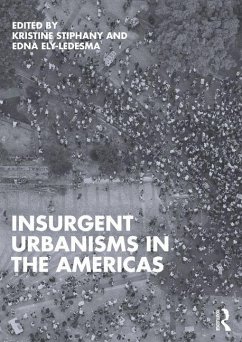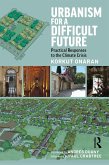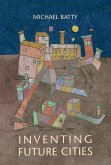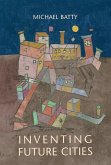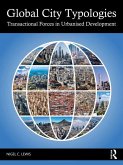Insurgent Urbanisms in the Americas
Herausgeber: Ely-Ledesma, Edna; Stiphany, Kristine
Insurgent Urbanisms in the Americas
Herausgeber: Ely-Ledesma, Edna; Stiphany, Kristine
- Broschiertes Buch
- Merkliste
- Auf die Merkliste
- Bewerten Bewerten
- Teilen
- Produkt teilen
- Produkterinnerung
- Produkterinnerung
Insurgent Urbanisms are often seen as spontaneous, grassroots responses to the inequities embedded in urban policies, projects, and systems. Through field research and firsthand activism, this book reveals how insurgencies not only resist but actively reshape urban orders, built environments, and public landscapes.
Andere Kunden interessierten sich auch für
![Urbanism for a Difficult Future Urbanism for a Difficult Future]() Korkut OnaranUrbanism for a Difficult Future53,99 €
Korkut OnaranUrbanism for a Difficult Future53,99 €![Inventing Future Cities Inventing Future Cities]() Michael BattyInventing Future Cities21,99 €
Michael BattyInventing Future Cities21,99 €![Inventing Future Cities Inventing Future Cities]() Michael BattyInventing Future Cities16,99 €
Michael BattyInventing Future Cities16,99 €![Henri Lefebvre and the Theory of the Production of Space Henri Lefebvre and the Theory of the Production of Space]() Christian SchmidHenri Lefebvre and the Theory of the Production of Space20,99 €
Christian SchmidHenri Lefebvre and the Theory of the Production of Space20,99 €![Planning and Urban Design for Attractive Arctic Cities Planning and Urban Design for Attractive Arctic Cities]() David ChapmanPlanning and Urban Design for Attractive Arctic Cities49,99 €
David ChapmanPlanning and Urban Design for Attractive Arctic Cities49,99 €![Global City Typologies Global City Typologies]() Nigel C. LewisGlobal City Typologies61,99 €
Nigel C. LewisGlobal City Typologies61,99 €![Hardware, Software, Heartware Hardware, Software, Heartware]() Jason PomeroyHardware, Software, Heartware53,99 €
Jason PomeroyHardware, Software, Heartware53,99 €-
-
-
Insurgent Urbanisms are often seen as spontaneous, grassroots responses to the inequities embedded in urban policies, projects, and systems. Through field research and firsthand activism, this book reveals how insurgencies not only resist but actively reshape urban orders, built environments, and public landscapes.
Produktdetails
- Produktdetails
- Verlag: Taylor & Francis Ltd
- Seitenzahl: 262
- Erscheinungstermin: 29. September 2025
- Englisch
- Abmessung: 173mm x 246mm x 20mm
- Gewicht: 584g
- ISBN-13: 9781032553825
- ISBN-10: 1032553820
- Artikelnr.: 73776453
- Herstellerkennzeichnung
- Libri GmbH
- Europaallee 1
- 36244 Bad Hersfeld
- gpsr@libri.de
- Verlag: Taylor & Francis Ltd
- Seitenzahl: 262
- Erscheinungstermin: 29. September 2025
- Englisch
- Abmessung: 173mm x 246mm x 20mm
- Gewicht: 584g
- ISBN-13: 9781032553825
- ISBN-10: 1032553820
- Artikelnr.: 73776453
- Herstellerkennzeichnung
- Libri GmbH
- Europaallee 1
- 36244 Bad Hersfeld
- gpsr@libri.de
Kristine Stiphany is an assistant professor of architecture at the University at Buffalo and the Director of the Design for Resilient Environments Lab. Her work examines the physical, social, and environmental contributions of housing to urbanism, with a particular focus on informal settlements in Latin America and along the U.S.-Mexico border. Edna Ely-Ledesma is an assistant professor in the Department of Planning and Landscape Architecture at the University of Wisconsin-Madison, and Director of the Kaufman Lab for the Study and Design of Food Systems and Marketplaces. Her research, teaching, and mentoring focuses on understanding the development of the smart, green, and just 21st century city.
Foreword Preface 1. Introduction: Insurgent Urbanisms Part 1. Origins:
Insurgency and Urban Housing 2. Between local initiatives and policy
responses: The Chilean experience of rental housing 3. Between Minimum
Space and Maximum Profitability: New Forms of Residential Precarity in
Rental Housing in Chile 4. From Utopia to Vernacular: Social Housing,
Informality, and Right to the City in Guayaquil, Ecuador 5. Housing
struggles and organizing in the wake of financialization in Mexico 6. Other
Schools: Educational Infrastructures on São Paulo's Peripheries 7. A Brief
Genealogy of Peripheral Insurgencies in São Paulo, Brazil Part 2.
Transformations: Insurgency and Knowledge Co-Construction 8. Faith-Based
Organizations: A Pathway to Insurgent Planning in Seattle? 9. Community
counter-mapping for urban upgrading in Fortaleza, Brazil 10. Attempts at
Homogenization, Hybridization, and Contestation at the México/United States
borderlands 11. 'Socially charged possibilities': Are political-spatial
formulations in São Paulo reflective of a right to the city? 12. Affordable
but Unhealthy: A Partial Right to the City in South Texas informal
subdivisions Part 3. Evolutions: Insurgency and Environmental Justice
13. From Environmental Criminalization to Insurgent Environmental Justice:
Occupying And Holding Ground In São Paulo's Southern Periphery 14.
Balancing Access and Regenerating Habitats: Towards a Socio-Ecological
Integration in the Rio Grande/Río Bravo Delta 15. Designing a New City
Place: Green Infrastructure on the U.S.-Mexico Border 16. From
infrastructure to environmental justice: The case of a multiracial
unincorporated community in North Texas 17. Resisting Colonialismo
Ambiental and Colonialismo Desastre: The Case of Casa Pueblo in Puerto Rico
18. Reframing Waller Creek: Landscape as an agent of urban change 19.
Conclusion: American Urbanism After a Right to the City
Insurgency and Urban Housing 2. Between local initiatives and policy
responses: The Chilean experience of rental housing 3. Between Minimum
Space and Maximum Profitability: New Forms of Residential Precarity in
Rental Housing in Chile 4. From Utopia to Vernacular: Social Housing,
Informality, and Right to the City in Guayaquil, Ecuador 5. Housing
struggles and organizing in the wake of financialization in Mexico 6. Other
Schools: Educational Infrastructures on São Paulo's Peripheries 7. A Brief
Genealogy of Peripheral Insurgencies in São Paulo, Brazil Part 2.
Transformations: Insurgency and Knowledge Co-Construction 8. Faith-Based
Organizations: A Pathway to Insurgent Planning in Seattle? 9. Community
counter-mapping for urban upgrading in Fortaleza, Brazil 10. Attempts at
Homogenization, Hybridization, and Contestation at the México/United States
borderlands 11. 'Socially charged possibilities': Are political-spatial
formulations in São Paulo reflective of a right to the city? 12. Affordable
but Unhealthy: A Partial Right to the City in South Texas informal
subdivisions Part 3. Evolutions: Insurgency and Environmental Justice
13. From Environmental Criminalization to Insurgent Environmental Justice:
Occupying And Holding Ground In São Paulo's Southern Periphery 14.
Balancing Access and Regenerating Habitats: Towards a Socio-Ecological
Integration in the Rio Grande/Río Bravo Delta 15. Designing a New City
Place: Green Infrastructure on the U.S.-Mexico Border 16. From
infrastructure to environmental justice: The case of a multiracial
unincorporated community in North Texas 17. Resisting Colonialismo
Ambiental and Colonialismo Desastre: The Case of Casa Pueblo in Puerto Rico
18. Reframing Waller Creek: Landscape as an agent of urban change 19.
Conclusion: American Urbanism After a Right to the City
Foreword Preface 1. Introduction: Insurgent Urbanisms Part 1. Origins:
Insurgency and Urban Housing 2. Between local initiatives and policy
responses: The Chilean experience of rental housing 3. Between Minimum
Space and Maximum Profitability: New Forms of Residential Precarity in
Rental Housing in Chile 4. From Utopia to Vernacular: Social Housing,
Informality, and Right to the City in Guayaquil, Ecuador 5. Housing
struggles and organizing in the wake of financialization in Mexico 6. Other
Schools: Educational Infrastructures on São Paulo's Peripheries 7. A Brief
Genealogy of Peripheral Insurgencies in São Paulo, Brazil Part 2.
Transformations: Insurgency and Knowledge Co-Construction 8. Faith-Based
Organizations: A Pathway to Insurgent Planning in Seattle? 9. Community
counter-mapping for urban upgrading in Fortaleza, Brazil 10. Attempts at
Homogenization, Hybridization, and Contestation at the México/United States
borderlands 11. 'Socially charged possibilities': Are political-spatial
formulations in São Paulo reflective of a right to the city? 12. Affordable
but Unhealthy: A Partial Right to the City in South Texas informal
subdivisions Part 3. Evolutions: Insurgency and Environmental Justice
13. From Environmental Criminalization to Insurgent Environmental Justice:
Occupying And Holding Ground In São Paulo's Southern Periphery 14.
Balancing Access and Regenerating Habitats: Towards a Socio-Ecological
Integration in the Rio Grande/Río Bravo Delta 15. Designing a New City
Place: Green Infrastructure on the U.S.-Mexico Border 16. From
infrastructure to environmental justice: The case of a multiracial
unincorporated community in North Texas 17. Resisting Colonialismo
Ambiental and Colonialismo Desastre: The Case of Casa Pueblo in Puerto Rico
18. Reframing Waller Creek: Landscape as an agent of urban change 19.
Conclusion: American Urbanism After a Right to the City
Insurgency and Urban Housing 2. Between local initiatives and policy
responses: The Chilean experience of rental housing 3. Between Minimum
Space and Maximum Profitability: New Forms of Residential Precarity in
Rental Housing in Chile 4. From Utopia to Vernacular: Social Housing,
Informality, and Right to the City in Guayaquil, Ecuador 5. Housing
struggles and organizing in the wake of financialization in Mexico 6. Other
Schools: Educational Infrastructures on São Paulo's Peripheries 7. A Brief
Genealogy of Peripheral Insurgencies in São Paulo, Brazil Part 2.
Transformations: Insurgency and Knowledge Co-Construction 8. Faith-Based
Organizations: A Pathway to Insurgent Planning in Seattle? 9. Community
counter-mapping for urban upgrading in Fortaleza, Brazil 10. Attempts at
Homogenization, Hybridization, and Contestation at the México/United States
borderlands 11. 'Socially charged possibilities': Are political-spatial
formulations in São Paulo reflective of a right to the city? 12. Affordable
but Unhealthy: A Partial Right to the City in South Texas informal
subdivisions Part 3. Evolutions: Insurgency and Environmental Justice
13. From Environmental Criminalization to Insurgent Environmental Justice:
Occupying And Holding Ground In São Paulo's Southern Periphery 14.
Balancing Access and Regenerating Habitats: Towards a Socio-Ecological
Integration in the Rio Grande/Río Bravo Delta 15. Designing a New City
Place: Green Infrastructure on the U.S.-Mexico Border 16. From
infrastructure to environmental justice: The case of a multiracial
unincorporated community in North Texas 17. Resisting Colonialismo
Ambiental and Colonialismo Desastre: The Case of Casa Pueblo in Puerto Rico
18. Reframing Waller Creek: Landscape as an agent of urban change 19.
Conclusion: American Urbanism After a Right to the City

